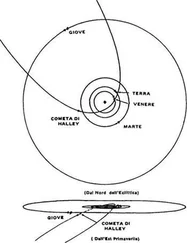As he walked away across South Field he remembered the undergraduate awe that ran through him in those first four long, hard years. Columbia was impressive. Its faculty was world famous, the buildings and laboratories imposing. Never had he suspected that the place might be a mill grinding out intelligent trolls willing and able to wire the circuits, draw the diagrams, to spin the humming wheels of industry. Never had he thought that institutions could stand or fall because of the vagaries of a few individuals, a few uninspected biases. Never. Religions do not teach doubt.
• • •
He took a taxi crosstown. The cab banged into potholes on some of the side streets, a jarring contrast with California’s smooth boulevards. He was just as glad Penny had refused to come; the city wasn’t at its best on the grill of August.
They had been tense with each other since the marriage thing came up. Maybe a short separation would help. Let the whole subject drift downstream into the past. Gordon watched the blur of faces going by outside. There was an earthen hum here, like the sound the IRT made going under Broadway. The hollow, heavy rumble seemed to him strangely threatening with its casual reminder of other people going about their other lives, totally ignorant of nuclear magnetic resonance and enigmatic sun-tanned Californians. His obsessions were merely his, not universal. And he realized that every time he tried to focus on Penny his mind skittered away, into the safe recesses of the spontaneous resonance muddle. So much for being captain of his fate.
He got out of the cab into the street where he grew up, blinking in the watery sunlight. Same beat-up trash cans adding their perfume, same grillwork, same Grundweiss grocery down the corner. Dark-eyed young housewives toting bags, herding their chattering children. The women were conservatively dressed, the only hint of undercurrents being their broad, lipsticked, sensuous mouths. Men in gray business suits hurrying by, black hair cropped short.
His mother was on the landing, arms spread wide, as he came up. He gave her a good-son kiss. When he came into the old living room with its funny, close flavors—“It’s in the furniture, the stuffing, it’s with us for life,” she said, as though the stuffing was immortal—it washed over him. He decided to just let everything go. Let her tell him the months of carefully stored gossip, show the engagement pictures of distant relatives, cook him “a good home meal, for once”—chopped liver, and kugel and flanken . They listened to calypso rhythms on the ancient brown Motorola in the corner. Later they went down to see the Grundweisses—“He tells me three times, bring that boy down. I’ll give him an apple like before”—and around the block, hailing friends, discussing seriously the statistics of earthquakes, heaving a Softball into the waning summer light for a bunch of kids playing in a lot. The next day, just from that one throw—“Can you believe it?”—his arm was sore.
He stayed two days. His sister came over, cheerful and busy and oddly calm. Her dark eyebrows moved with each arch of a sentence, each surge of her face, making dancing parentheses. Friends dropped by. Gordon went all the way over to 70th Street to get some California wine for these occasions, but he was the only one who drank more than a glass. Still, they talked and joked with as much animation as any La Jolla cocktail party, proving alcohol an unnecessary lubricant.
Except his mother. She ran out of neighborhood news soon enough and then relied on his friends or his sister to carry the conversation. Alone with him, she said little. He found himself slowly drawn into this vacuum. The apartment had been thick with talk as he grew up, except in the last times of his father, and a silence here unnerved him. Gordon told his mother about the battle over his work. Of Saul Shriffer. (No, she had not seen the TV news, but she heard. She wrote him, remember?) Of spontaneous resonance. Of Tulare’s warning. And finally, of Penny. His mother didn’t, wouldn’t, couldn’t believe a girl would turn down a man like her son. What could she be thinking of, to do that? Gordon found this response unexpectedly pleasing; he had forgotten the ability of mothers to shore up sons’ egos. He confessed to her that somehow he had gotten into the habit of thinking he and Penny would settle into something more conventional (“respectable,” his mother corrected). It had come as a surprise that Penny wasn’t thinking in parallel. Something had happened to him then. He tried to explain it to his mother. She made the familiar, encouraging sounds. “Maybe, I don’t know, it was… Penny I wanted to hold on to, now that everything else is going kaput…” But that wasn’t quite what he meant, either. He knew the words were false as soon as they were out. His mother picked up on them, though. “So she doesn’t know what’s what, this is a surprise? I tried to tell you that.” Gordon shook his head, sipping tea, confused. It was no use, he saw. He was all jumbled up inside and he suddenly didn’t want to talk about Penny any more. He started on the physics again and his mother clattered the spoons and teapot with fresh energy, smiling, “Good work, yes, that’s good for you now. Show her what she’s lost by—” and on she went, longer than Gordon wanted. He felt a momentum building in him, an urgency. He veered from these muddy matters of women. As his mother’s voice droned in the heavy air he thought about Claudia Zinnes. He shuffled numbers and equipment in his head. He was making some plans when her phrases gradually penetrated; she thought he was leaving Penny. “Huh?” he sputtered, and she said blankly, “Well, after that girl rejected you—” An argument followed. It reminded him far too much of the debates over when he had to be home from dates, and what he wore, and all the other small things that finally drove him to an apartment of his own. It ended with the same sad shaking of the head, the “You are fartootst , Gordon, fartootst …” He changed the subject, wanted to call up Uncle Herb. “He is in Massachusetts. He bought a consignment of hats cheap, now goes up there to spread them around. The market fell kapoosh when Kennedy wouldn’t wear one, you know, but your uncle figures in New England the men, their heads are cold.” She made more tea, they went for a walk. The silences widened between them. Gordon made no attempt to bridge them. His mother was aboil over Penny, he could see that, but he’d had enough. He could stay longer, but the spreading silences promised more trouble. He stayed overnight, took her to an off-Broadway play and topped it off with crepes at Henry VIII’s. The next morning he caught the 8:28 United for the coast.
CHAPTER TWENTY EIGHT

AUGUST 12, 1963
COOPER LOOKED DOUBTFUL. “YOU THINK THIS IS enough?”
“For now, yeah. Who knows?”—Gordon shrugged—“Maybe for good, too.”
“I at least ought to fill in some of the high field observations.”
“Not that important.”
“After what that committee did to me, I want to be sure—”
“More data isn’t the answer. You need more background reading, more analysis of your data, things like that. Not more numbers churning out of the lab.”
“You sure?”
“You can close out your run by tomorrow.”
“Umm. Well, okay.”
• • •
In reality, Cooper probably could strengthen his case with more data. Gordon had always disliked the practice of overmeasuring every effect, though, mostly because he suspected it deadened the imagination. After a while you saw only what you expected to see. How could he be sure Cooper was really taking all the data as it came?
Читать дальше













